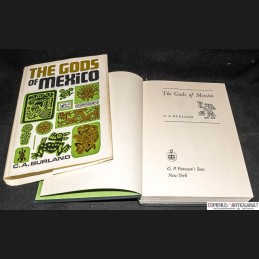Burland, C.A.
The Gods of Mexico. New York: Putnam, 1967. xiii, 219 Seiten mit Abbildungen auf Tafeln, Literaturverzeichnis und Register. Leinen mit Schutzumschlag. Grossoktav.
* Schutzumschlag mit kleinen Rissen, leicht gebräunt.
Bestell-Nr.155277
Burland |
Naturreligionen |
Lateinamerika |
Mexico |
Mexiko |
Praekolumb |
Archaeologie |
Azteken
This study of the ancient religion of Mexico is an original attempt to explain the meaning behind its beliefs and practices and to relate them to human behavior in primitive society.
Mr. Burland begins with a historical survey from earliest times to the Spanish conquest, using the evidence of modern archeological discoveries to trace the various cultures—including the Olmec, Maya, Toltec and Aztec—which succeeded and influenced one another. He goes on to describe the structure of Aztec society and its religious hierarchy. In his account of the various annual cycles of religious festivals he describes the different aspects and magical powers attributed to the gods, showing how the ceremonies dedicated to them formed a complete system based on the changing seasons and observations of the stars. The great anomaly in the system is Quetzalcoatl; Mr. Burland relates the story of his life and analyzes his significance.
He gives an account of Mexican art and prophecy, showing how these too fitted into the general pattern of religious belief, and an assessment of the antiquity of the gods that recur in the various cultures going back to earliest times. He concludes with an evaluation of the Mexican civilization "which covers a span of time comparable to China from Chou to Ming, or considerably longer than Roman history from Romulus to Constantine."
Besides archeological evidence, Mr. Burland draws on the Mexican religious codices and the accounts of the post-conquest Spanish missionaries, Fathers Bernardino de Sahagun and Toribo de Benavente. His study of this primitive nature religion, with on the one hand its highly developed art, on the other its human sacrifice, has a relevance far beyond the confines of ancient Mexico.
The author has recently retired from the British Museum. Among his publications are: The Magic Books from Mexico, Life and Art in Ancient Mexico, and his edition of The Selden Rolls. He is currently working on the commentary for the facsimile edition of Codex Laud.
Contents
An Alphabetical List of the Major Gods page ix
Guide to Pronunciation xiii
Maps of Mexico
Introduction 3
1 The Earliest Peoples and the Olmecs 16
2 Teotihuacan and the Maya 25
3 The Toltec Power 31
4 The Growth of the City States 40
5 The Aztecs 47
6 Religious Life among the Aztecs 60
7 The Festivals of the Farmer's Year 73
8 The Count of Fate 81
9 The Gods and Symbols of the Twenty Days 87
10 The Gods of the Thirteen-day Periods 92
11 The Lords of the Night and other Influences 108
12 Life and the Gods 115
13 The Nature of the Gods 127
14 The Mystery of Quetzalcoatl 148
15 The Visionaries 165
16 The Antiquity of the Gods 175
17 Conclusion 184
Appendix I: The Mexican and Maya Codices 193
Appendix II: Tlachtli 199
Appendix III: Notes on the Illustrations 201
Bibliography 207
Index 213
Plates
Between pages 146-7
1 Olmec pottery figure from La Bocas za The head of a coyote from Tequixquic b Giant stone head from La Venta 3a The pyramid of the Sun at San Juan Teotihuacan b The House of the Frog at Tula 42 The Ball Court at Chichen Itza b A pottery representation of Xuihtecuhtli S a Stone figure of Chalchihuitlicue b Chalchihuitlicue from Codex Fejervary Mayer 6a Ometecuhtli from Codex Fejervary Mayer b Tlaloc from Codex Vaticanus 3773 c Xipe Totec from Codex Borgia d Xihtecuhtli from Codex Borgia 7a Tlazolteotl from Codex Fejervary Mayer b The blue Tezcatlipoca (Huitzilopochtli) from Codex Fejervary Mayer c Tezcatlipoca from Codex Borgia d Quetzalcoatl from Codex Fejervary Mayer e Mictlantecuhtli from Codex Fejervary Mayer 8 A page from Codex Fejervary Mayer
Maps: 1. A physical map of Mexico 2. The main archaeological sites page 2
The illustration from Codex Vindobonensis on the title page represents a chief named Five Cozcaquahtli bringing a gift of flowers







 frais de transport
frais de transport
 Google Mail
Google Mail
